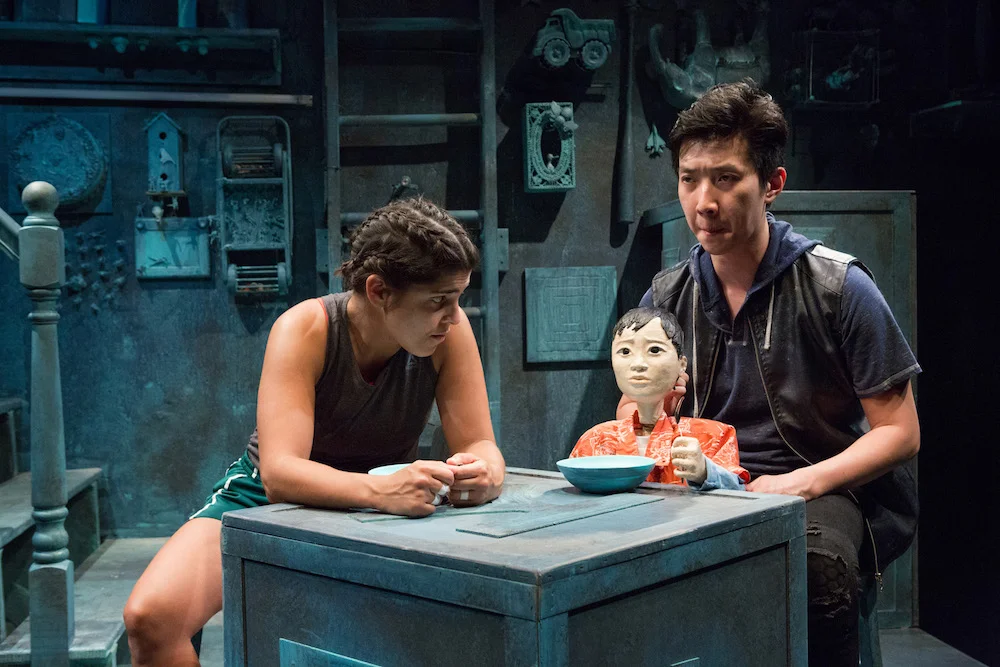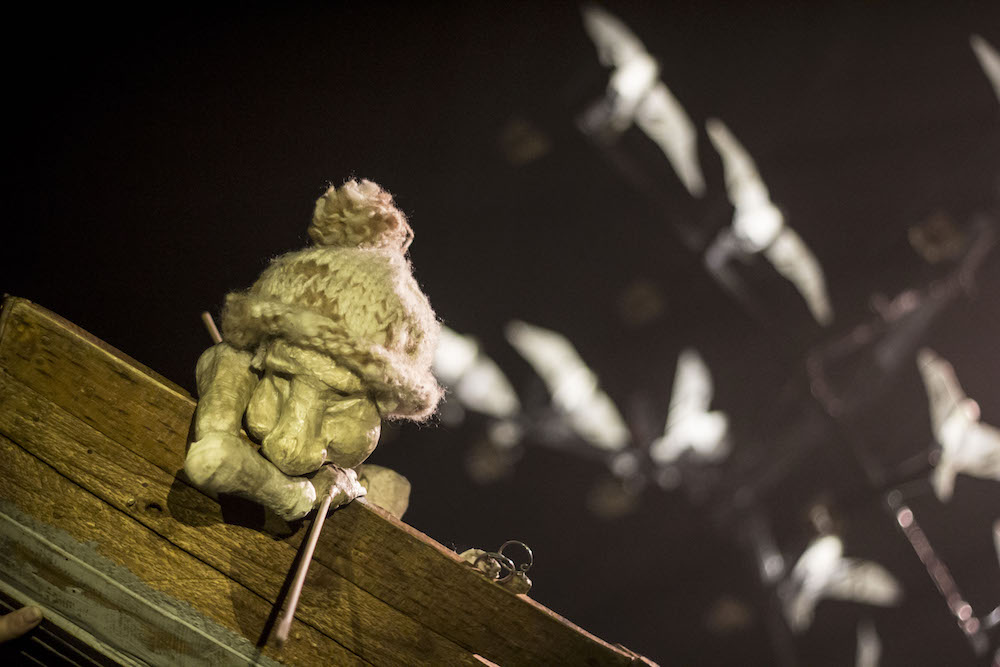"Swing State" written by Rebecca Gilman, produced by Goodman Theatre.
It promised from the title to be a political evening, but politics were only a nuanced undercurrent of a tightly written visit with denizens of Gilman’s fictional small town and county in central Wisconsin.
Read moreBlack Spring in the Arts - Five Chicago Productions by Black Creators
In the Fall of 2021, all seven new productions opening on Broadway were by Black playwrights. This Spring, Chicago is flooded with Black cultural productions. Goodman Theatre, Steppenwolf Theater, TimeLine Theater, Lyric Opera of Chicago, Chicago Opera Theater—and those are just the ones that I attend. Why this bounty of great and good art?
Read moreCabinet of Curiosity Presents THE FAREWELL FABLES: SATELLITES, SONGS AND CEREAL Review – The Gods Are Disappointed with Us
Chicago Theater in October and November – Toad Kissing and Mosquitoes
Lindiwe, Produced by Steppenwolf Theater Company, Written and Co-Directed by Eric Simonson and Jonathan Berry, Music by Ladysmith Black Mambazo – Short Review
This is the same Eric Simonson who write Tony award-winning Song of Jacob Zulu, featuring the music of Ladysmith Black Mambazo. I felt Simonson got tagged with the credit for playwright because someone had to take the blame. The program notes clearly state that amid the desire for the two groups to work together again, they were both coming through rough patches due to mourning the passing of ensemble members. A year and a half ago they conceived a workable idea and began to develop it collaboratively. (Note to self: beware the word collaboratively when used with plot development.) So it’s likely that Simonson did no more that nip, tuck and tidy the uninspired story.
The music is wonderful. Ladysmith Black Mambazo sings in tight harmony, sometimes so low that it whispers. Their dance is joyous—high kicks that would be welcome in Radio City Music Hall. Nondumiso Tembe (Lindiwe) has a rich, vibrato free voice. When she joins Ladysmith, you would swear she is a company member, as her hushed voice sits just above the men before it breaks into its own soaring melody.
Recommendation: Worth the price of the ticket for the music, but don’t go expecting a “Steppenwolf” play.
Sombras Tango Cabaret, Produced by Tango 21 Dance Theater (T21DT),created by co-founders Jorge Niedas and Liz Sung - Short Review
DBH and I love a good tango especially danced by non-professionals who feel the music and glide effortlessly on the dance floor--no daring dips, no flipping feet, just ordinary people like us, except they can dance. So, the opportunity to see a tango cabaret presented by non-professionals promised just such an experience. And there was some excellent tango, singing, and a polished pianist/composer (Bob Solone.)
Here’s the big BUT—Niedas and Sung tried to tie the performances together with a hackneyed plot of talented gay son mimicking the Cabaret Emcee (Trent Oldham with a great baritone voice) , estranged mother who reconciles, and a cast of dancer/musicians performing a corny script about a group of non-professional dancer/musicians who perform in a Tango Cabaret. And no one can act.
Recommendation: Not worth the price of admission, though some performances were lovely.
Julia Siple as Jennie
Mosquitoes, Produced by Steep Theatre, written by Lucy Kirkwood, Directed by Jaclynn Jutting – Short Review
Can one play encompass the cosmic macro and micro reality of our relationships with each other and with our world? In Mosquitoes, Lucy Kirkwood knocks it out of the park with the micro family relationship—not so much with the macro universe and our place in it.
While scientists are reveling in the validation of the existence of Higgs Boson particles in 2008, the nuclear family of Alice (Cindy Marker), one of the scientific team, is falling apart. Her sister, Jenny (Julia Siple,) embodies the inflexible will of the anti-science crowd. Informed by the internet, she refuses to have scans of her womb while pregnant, fearful it will harm the fetus. Later, when her healthy child needs to be vaccinated, she again refuses, butting against the objections of her scientist mother and sister.
Twined into this conflict is that of Alice with her teenage son, Luke (Alexander Stuart), hungry for a relationship with his estranged scientist father. Luke is sufficiently klutzy with his first girlfriend, Natalie (Upasna Barath) that he finds comfort from his needy Aunt Jenny. She and her irascible and incontinent mother, Karen (Meg Thalken in a wickedly sharp role) have moved in with Alice. Everything about the conflicted family is rich with angst and uncensored retorts. Julia Siple resounds in the role of Jennie; maddening, conniving, a prime manipulator—an award-winning performance.
And then there is the cosmic world intersticed in three or four plot-fogging video segments of nebular particles and planets rushing at the camera. The performers, clad in lab coats and goggles, stand in ranks while The Boson (Richard Costes) recites lines meaningless to me. Perhaps a student of cosmology would understand/engage, but in my humble opinion, this play would be “stellar” without the cosmos.
Highly recommended; use the cosmic breaks to rest your eyes.
“Sundown, Yellow Moon” produced by The Raven Theater – a Short Review
Jordan Dell Harris, Liz Chidester/Photo: Michael Brosilow
By the end of this 90-minute one act play, I was invested in the characters and did not want to the story to end. The father Tom, played to a tee by Will Casey, shouldered his self-inflicted emotional wounds nobly. The twins who return home to support their father, Ray, played by Liz Chidester and Joey, played by Diana Coates, were suitable fraternal opposites, caring for each other as their lives approach separate crises, but not too much. Jordan Dell Harris as Carver, Tom’s counselor, is also Ray’s potential love interest, but one with a dubious past. Bobby and Jean (Rob Frankel and Jeanne T. Arrigo), are a sympathetic neighbor couple who echo the family’s own fears. The plot is not complex—it deals mostly with fear of change and how that affects the family. Playwright Rachel Bonds provides us with just enough information and action to pique curiosity.
Though there is music, Sundown, Yellow Moon is not billed as a musical as the music is not integral to the production. It’s used to provide pauses for reflection in what is already a slow reveal. In two instances, Carver sits stage front and listens to recordings of songs he sang in a high school group. The reason for the recordings is questionable—and interminable for me. It turns out in a subsequent duet with Ray/Chidester that Carver/Harris has a great voice. Since the names of all the songs, written by The Bengsons, are not mentioned in the program notes, I can’t identify the beautiful duet with Ray and Carver, the best take-away from the show.
It’s a tribute to the cast that they were able to stir emotional connection with the audience from a play with such a limited dramatic arc.
Recommended for theater fans who appreciate a slow-paced family drama.
Sundown, Yellow Moon
Raven Theatre East Stage, 6157 N. Clark St. (at Granville)
Thurs-Sat at 7:30; Sun at 3
ends on November 17, 2019
for tickets, call 773.338.2177 or visit Raven Theatre
“At the Wake of a Dead Drag Queen” a New Play by Terry Guest Produced by The Story Theatre
Terry Guest and Paul Michael Thomson
Terry Guest wrote this play and is the lead role, Courtney/Anthony, a dead African American drag queen performing in Athens, GA. The story is told in flashbacks, beginning with Courtney in her prime -- long red wig, sexy dress, gloves, heels, cape, and smile. When Courtney smiles, the audience melts with a sigh. Terry Guest is a provocative drag queen with a little lipstick and huge eyelashes.
Courtney’s protagonist/lover, Vickie/Hunter, is strongly played by Paul Michael Thomson. They perform in a sleezy club and fall into love/lust. As anathema as homosexuality is to the black community, it is equally deplored by Hunter’s family of Georgia crackers. Both young men are HIV positive.
The one-act play takes place mostly in a dressing room upstage, backed with mirrors, wigs, and a long line of flamboyant costume dresses and jackets stage right. Much of the dialogue faces the mirrors, away from the audience, but reflected, providing the aura of privacy. The drag performance stage is center left, large when compared with the dressing area. But Courtney is not limited by the stage, she is immediately flirting with us, dazzling with that smile and chatting us up. Often Vickie/Hunter directly address the audience.
“At the Wake of a Dead Drag Queen” works on many levels. The two men are strong and beautiful in costume and performance. They are vulnerable and sad dressed for the world outside the stage door. They are both living with AIDS; Courtney/Anthony unsuccessfully, seeming to shun assistance. Vickie/Hunter appears to be on medication, maintaining his spirit as Courtney/Anthony withers.
Both actors are strong. The writing is direct and left me wanting to read the play to see how many layers Guest weaves into his dialogues and monologues. As an audience member who has never been to a drag show, that environment was fascinating. As a theater fan, the story was engrossing. On a human level, this is a wake, and I felt loss.
Highly recommended for fans of small, edgy theater.
Terry Guest
Terry Guest will premier another play with The Story Theatre, “Marie Antoinette and the Magical Negroes”. Just the title assures that I’ll be there. Sign up at their website for future production information.
“The Great Leap” produced by Steppenwolf, written by Lauren Yee
If only basketball really could move the needle toward positive trade relations with the Chinese. But this play looks back in history to the 70s and 80s when China was emerging from the Mao re-education programs, through Tiananmen Square in 1989. Multi award-winning Playwriter Lauren Yee bases the story on her father’s return to China to play exhibition games in the 80s. He was a San Francisco Chinatown street player good enough to make the U.S. exhibition team, which was sounded defeated by the “tall tree” Chinese teams.
The story features the street ball player, Manford (Glenn Obrero), a legend at 17. But the protagonists are the coaches, Saul (Keith Kupferer) for the U.S. and Wen Chang (James Seol) for the Chinese. When they meet for the big exhibition game in 1989, they reflect on their original meeting in the 70s when Saul visited China to teach U.S. techniques to Chinese coaches. Since this meeting, Saul’s career and his life have peaked; he is on the downside. Wen Chang has reached the top of his career, sacrificing family and personal life for the team and his Communist ideals. Saul is earthy, gruf, an East Coast Jew in a sweat suit. Wen Chang is controlled, almost humorless, a straight-laced Chinese in a black business suit.
In a stretch of the imagination, we learn the back story of Manford and Coach Wen Chang. Telling more would be a plot spoiler, but the pieces fit, if a bit forced. Bringing together Manford’s story is Connie (Deanna Myers) his “cousin” from the U.S. who helps temper his emotional outbursts.
The Great Leap is staged in the Steppenwolf Upstairs space, set in the profile style, which most closely resembles a basketball court—baskets at both ends, risers along the sides. A compressed court is drawn on the stage. Combined with pinpoint lights and Obrero’s athleticism, Manford easily demonstrates his skill with the ball. Shots are completed with a resounding “swish” for scores or a metallic “clank” for misses. Set pieces are few—folding chairs, basketball rack, small tables, smoothly brought on and off the stage by the actors. Video boards sit at the top of each bank of seats, projecting scores, expanding the sets, and illustrating history with news flashes. All together they produced maximum effect in a small theater.
The actors were uniformly excellent. Glenn Obrero plays the manic Manford to the edge of belief with athleticism that makes his story real. The coaches, Keith Kupferer and James Seol play off each other like a Federer/Nadal match. Deanna Myers is the voice of reason in an otherwise edgy script. If only the actors would remember that a profile set means you play in “profile”, because when you face one way or the other, your voice does not carry.
Recommended for an enjoyable evening of interesting theater.
Lookingglass Theater Production of "Mary Shelly's Frankenstein."
Earlier this summer Ed and I saw the Lookingglass Theater Production of Mary Shelly's Frankenstein.
We enjoyed it so much that we both read the book again. Surprisingly, it was interesting and not too archaic. Yes, Mary Shelly blabs on a bit about things we would consider inconsequential to the plot. But this book is 150 years old. If you pick up novels by Trollope, written 50 years later, they clip along. Ed and I gave each other permission to skim through the repetitious parts. Actually, because the play must be radically simplified, the sequencing of the book and the manner in which the story was told were more sensible than the play. Well done, Lookingglass Theater, and well done 18 year old Mary Shelly.
North Shore Center for The Performing Arts Presents MY LIFE ON A DIET Review – Warm and Funny
Gift Theatre Presents WOLF PLAY Review –Layers of Compelling Drama
Reviewer Ann Boland is committed to Chicago theater. Involved in the audience since the early 80’s, she’s witnessed firsthand the rise of our theater scene, our exceptional local talent, and the vigor of each new generation. Ann handles public relations for authors and works on programs to help seniors with neurological movement disorders. Please visit her website for more information.
Chicago International Puppet Theater Festival 2019 Presents Compagnie La Pendue’s TRIA FATA – Review – Joy in Life and Death
Chicago International Puppet Festival and Instituto Cervantes Present Silencio Blanco’s PESCADOR Review – Fishing Can Be Tedious
Chicago International Puppet Theater Festival and Chicago Shakespeare Theater present L’APRES-MIDI D’UN FOEHN VERSION 1 – Review – Ephemerality Denied
Chicago International Puppet Theater Festival 2019: Plexus Polaire presents Chambre Noire
Chicago International Puppet Theater Festival 2019: Shank's Mare
Auditorium Theatre Hosts THE LEGEND OF ZYGIMANTAS AUGUSTAS AND BARBORA RADVILAITE Review- Stunning Tribute to Lithuanian Culture
The ensemble and the audience at the Auditorium Theater
City Lit Theater Presents ARMS AND THE MAN Review- Shaw’s LOL Satire of the Folly of War
"Jesus Christ Superstar" by Andrew Lloyd Webber and Tim Rice produced by The Lyric Opera Chicago
The Lyric Opera House from the stage.
The Lyric seats 3,563. Fortunately, our seats were closer than those at the Paramount in Aurora. I’d never seen Superstar. It was interesting to see so many attendees my age who were there for love and nostalgia, and the young and very young who were there because this musical is timeless. No need to cover the book. We know the story. The telling was mesmerizing.
Herod descends the ramp that also forms a crucifix.
There is no dialogue, only song and orchestration. The cast was “beige”, a few white, and the rest black and tan. Likely, this is authentic for the eastern Mediterranean setting. Costumes, except for Herod, were “beige”, most looked like old workout clothes. The set worked wonderfully for the all sorts of scenes: crowd, groups and solos. The ramp coming from stage rear at an angle was used for entrances (King Herod with gold cape 50 feet long) and exits, and as a dining table for the last supper sequence. The tableau was an homage to da Vinci’s The Last Supper.
The ramp staged like DaVinci's Last Supper
The music combines rock and roll with jazz, funk, and lyrical ballads ("I Don’t Know How to Love Him"). As usual, every performer and every instrument was miked, which gave a sameness to the sound. The lyrics are difficult enough to understand because they are sung quickly. And, when there was a crescendo of voices and orchestra, the person running the sound board did nothing to modulate the mikes – deafening. I would have benefited from reading the libretto prior to the performance. But it did not dawn on me that understanding would be so difficult.
Overall, I enjoyed the performance. Now, I’ve seen every Andrew Lloyd Webber musical. Wasn’t on my bucket list, but great fun.

























